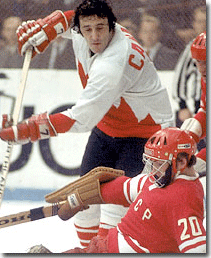All of a sudden, right out of the blue, there’s another entry on the NHL.com! In the middle of the summer! Excellent. Read it here, or just click below to get to my piece.

Hockey Night in Helsinki
A few weeks ago, I found myself sitting at a huge table at a friend’s house, all geared up and excited for what was going to be a great hockey night in Finland. The setup was perfect: three friends together – one of them a chef that can make poutine that would make the owners of Quebec’s pride, Ashton’s, green with envy, and a referee – with no distractions, such as girlfriends or wives, and no work, or email.
Just three guys, here and now. And then forty guys from almost forty years ago.
It was time for our big 1972 Summit Series Night.
And for one of us, a trip to a world he had never lived in because he was born four years after the 1972 Summit Series. He had never seen Valeri Kharlamov play, he had never witnessed Phil Esposito grind in front of the net, and he had no recollection of players flying down the ice without helmets.
The plan was to watch all eight games – four played in Canada and the four played in Moscow – all the way to the Henderson goal, even if we all silently agreed that we’d probably not make it. After all, it would amount to about 16 hours of hockey – great hockey, yes, but still – and we didn’t get started until 6 p.m.
But at six, there we were, with a bowl of poutine in our hands, with the national anthems and the player introductions on the screen in front of us. These were the idols of my generation, and the (player) generation before me: Boris Mikhailov with his nose, Vladimir Petrov and his helmet without the strap, Valeri Kharlamov and his quick hands, Alexander Maltsev, the flashy number 10, and Vladislav Tretiak, the lanky goalie on the CCCP side.
For us, especially for me and the teammate-turned-chef, the Soviet players were the big stars, the idols, the ones that dominated our hockey world. Every spring in the World Championships, they would pound Finland through the cracks in the ice, and we’d be sitting at home, considering a 6-1 loss a great accomplishment. During the Summit Series, even the one replayed in that living room in Helsinki in 2008, my friend, the old teammate, now chef-and-ref, still cheered for the Soviets.
The third guy in our group doesn’t remember those days. For him, they’re nice stories. He was three at the time of the Miracle, only twelve when Alexander Mogilny defected to Canada and 19 when Finland won the hockey world championship.
When I was 19, there was a rumor about a nuclear accident in a place called Chernobyl during the hockey Worlds.
The Cold War was very much on.
The Summit Series was more than just a challenge in hockey. It was a clash of two worlds. It was the clean-shaven Soviets versus the Canadians with the bushy sideburns. The helmets versus the haired. The passing game versus the slot grinders. The red versus the white. Phil Esposito versus Tretiak. Tony Esposito versus Kharlamov. And of course, the Capitalists versus the Communists.
Maybe that’s why Phil Esposito seemed to take the ceremonial faceoff very seriously.
Now, 36 years later, the last battle didn’t feel as important. It was all about hockey.
But when Team Canada took the lead in the first shift of the first game, all three of us were laughing and cheering so that tears were running down our cheeks. The hockey was so great, and yet innocent in a way. The blades were square, the shots not that hard, the goalies looked skinny, and the two referees’ pants were way too short. The players that got a penalty sat right next to the announcer.
But the hits seemed clean, the pace and energy was excellent, and it’s not every day you see a player switch from shooting left to being a rightie, like Phil Esposito did.
The move was so incredible that we had to rewind the film and watch it again. Instead of going around the Soviet defenseman, or sending off a backhander, Esposito switched his grip and took a shot from his right.
Hockey has changed so much, and not at all.
By the third period in Game 3, the chef-ref was asleep on the couch, and I turned off the TV.
Next time, we’ll watch the four games played in Moscow. It’s my turn to be in charge of the menu, and it should be something Russian this time.
